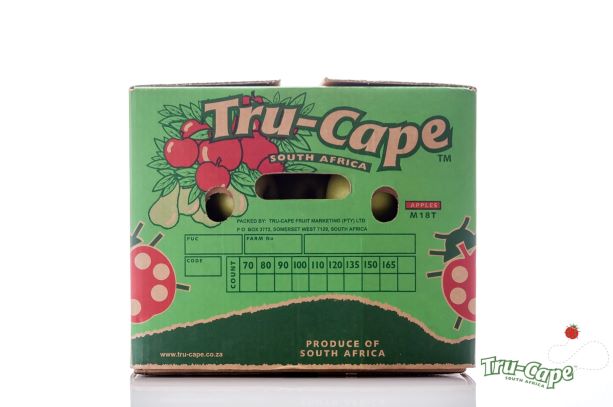Sometimes knowing the right lingo can make you sound like an industry insider. Just like if you are on a game drive and the ranger says over the radio they’ve spotted an “Indlovo”, those in the know will expect to see an elephant pretty soon.
As the largest exporter of South African apples and pears, Tru-Cape Fruit Marketing would like you to sound like an industry expert too. Tru-Cape Marketing Director, Conrad Fick, points out the most commonly used jargon. “First off is the way we describe apples and pears as pome fruit (from the old French word ‘pome’ – meaning apple – so apple-like fruit). This, as a contrast to stone fruit that only has one hard, stone-like pip, means apples and pears have many pips and are deciduous, which means they come from trees that lose their leaves in winter.
People working in the industry also use a three-letter abbreviation (from the computerised stock system) to describe the variety or cultivar. So rather than Granny Smith we talk about GRS, FUJ for Fuji and GDL for Golden Delicious.” Fick explains that fruit size is described as the number of fruit of a particular size that will fit into a 18.25kg for apples or 12.5kg or equivalent carton for pears. “We call this the fruit count. So, a count 80 or C80 means that in that box you will find 80 apples. Another term we often use is ‘fruit programme’. No, this isn’t your favourite app or TV show but how the industry describes advance orders for fruit.
One of the things that differentiates Tru-Cape from our competitors is that our growers have the largest number of hectares (that’s how we measure agricultural land) with apples and pears and we can tell the supermarkets in South Africa and in 104 countries around the globe a season ahead about the kind of crop we expect. They, in turn, give us a programme where they ask us to deliver a certain number of cartons of a particular variety in scheduled weeks. This means, in practice, that we are able to promise most of a crop of apples and pears even before it is picked from the tree. GTIN is another industry term which means Global Trade Item Number and we use this to identify each of our products in a unique way.
The most important thing, from a marketing perspective, which allows us to have apples on the shelf for 12-months of the year is that we have developed technologies that arrest the development of the fruit before it fully matures. This, called Controlled Atmosphere, chills the fruit to just below freezing point and removes most of the oxygen from the atmosphere in which the fruit is stored. This puts the fruit into a rest-state, similar to what happens when animals hibernate for the winter months. When the time comes that we need the fruit on the shelves, it is gently “awoken” by increasing oxygen and the temperature. Controlled Atmosphere is called CA and the Regular Atmosphere, RA is the name for the giant fridges in which the fruit is stored before being delivered. We also have DCA storage which is Dynamic Controlled-Atmosphere which, using chlorophyl fluorescence determines how to manage the oxygen concentration most effectively.”
Fick explains that while apples and pears contain seeds, planting those seeds is no guarantee of the variety that will grow. “So when you plant the pips of a Granny Smith apple you have a very small chance of a Granny Smith apple growing in the same way that you and your siblings, while coming from the same parents, are rarely identical and do not resemble the mother 100%. To be sure an orchard of Granny Smith trees will grow, the nursery grafts budwood, the technical term for a piece of the branch, on to rootstock, another technical term for the roots of the tree. The type of rootstock and budwood selected is a highly scientific process that will deliver the best quality and size of fruit.”
The next time you are purchasing apples and pears take a moment to think about how you are supporting a R10 billion South African industry that provides in excess of 27 000 direct, on-farm jobs and a further 109 000 dependents who are impacted by the success of the industry.
See Tru-Cape.com for more.









